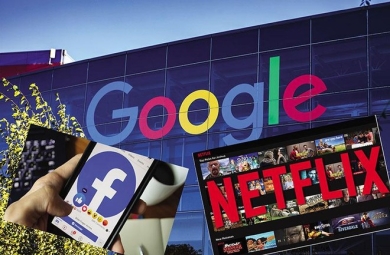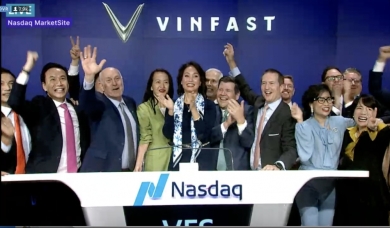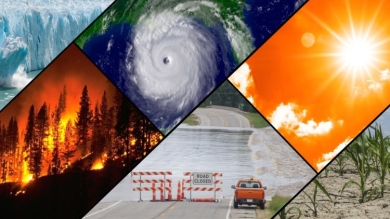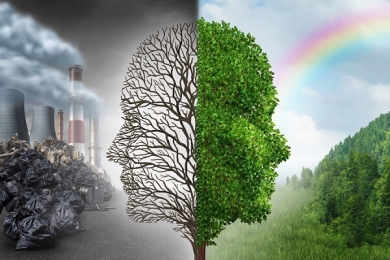If you’re a regular reader of this column, you know that I often criticize what the United States is doing on the global stage. I thought George W. Bush’s presidency was a foreign-policy train wreck; Barack Obama’s eight years in office were a disappointment, Donald Trump’s first term a hot mess, and Joe Biden’s four years were tarnished by damaging strategic and moral lapses. Alas, it has taken Trump and his appointees less than three months to outdo them all for incompetent foreign-policy wingnuttery. And this would be true even if Signalgate had never occurred.

U.S. President Donald Trump gives a thumbs-up upon arrival at Joint Base Andrews in Maryland after spending the weekend at Mar-a-Lago. U.S. President Donald Trump gives a thumbs-up upon arrival at Joint Base Andrews in Maryland on April 6, after spending the weekend at Mar-a-Lago.
To be clear: I don’t think Trump is acting on behalf of a foreign power or that he consciously wants to make the United States less secure and less prosperous; he is just acting as if he were. One might say that he’s following this handy “Five-Step Guide to Screwing Up U.S. Foreign Policy.”
Step 1: Appoint a lot of sycophants and loyalists.
If you want to ruin a country, you should start by making sure that nobody can stop you from doing dumb and damaging things. So you need to appoint people who are incompetent, blindly loyal, totally dependent on your patronage, or lacking in backbone or principle, and get rid of anyone who might be independent, principled, and good at their jobs.
As Walter Lippmann wisely observed, “When all think alike, no one thinks very much,” and that makes it easier for a misguided leader to drive a country into a ditch. Lack of opposition helped Joseph Stalin mismanage the Soviet economy, allowed Mao Zedong to launch the disastrous “Great Leap Forward,” and made it possible for Adolf Hitler to declare war on the rest of Europe. Lack of strong internal dissent helped Bush blunder into Iraq in 2003. If you want to screw up your country’s foreign policy, ignoring dissenting voices and relying on lackeys is a good place to start. Indeed, Step 1 is critical to the entire program: If you are going to do a lot of dumb things, you don’t want anyone to be able to contradict or constrain you.
Step 2: Pick fights with as many states as possible.
International politics is inherently competitive, which is why states are better off with lots of mostly friendly partners and relatively few enemies. A successful foreign policy, therefore, is one that maximizes the support you get from others and minimizes the number of opponents you face. Aided by highly favorable geography, the United States has been remarkably successful at getting support from consequential allies in other parts of the world, and it was much better at doing this than most of its adversaries. A key ingredient of that success was not acting overly aggressive or belligerent, even while exercising enormous influence. By contrast, Wilhelmine Germany, the Soviet Union, Maoist China, Libya, and Iraq under Saddam Hussein all adopted bellicose and threatening behavior that encouraged their neighbors and others to join forces against them. All great powers play hardball on occasion, but a smart great power wraps its mailed fist in a velvet glove, so as not to provoke unnecessary opposition.
What is Trump doing instead? In less than three months, the Trump administration has repeatedly insulted our European allies; threatened to seize territory belonging to one of them (Denmark); and picked needless fights with Colombia, Mexico, Canada, and several other countries. Trump and Vice President J.D. Vance have publicly bullied Ukrainian President Volodymyr Zelensky in the Oval Office and, like Mafia bosses, keep trying to coerce Ukraine into signing over mineral rights in exchange for continued U.S. assistance. With great fanfare, the administration has dismantled the U.S. Agency for International Development, withdrawn from the World Health Organization, and made it abundantly clear that the government of the world’s largest economy is no longer interested in helping less fortunate societies. Can you think of a better way to make China look good by comparison?
And then last week, Trump blithely ignored repeated warnings from economists from across the political spectrum and imposed a bunch of bizarrely constructed tariffs on a long list of allies and adversaries. Wall Street’s verdict on Trump’s ignorant decision was instantaneous—the largest two-day plunge in the stock market in U.S. history—as forecasts of a recession soared. This harebrained decision wasn’t a response to an emergency or forced upon the country by others; it was a self-inflicted wound that will make millions of Americans poorer, even if they don’t own a single share of stock.
The geopolitical consequences will be no less significant. Some states are already retaliating in kind—further raising the risks of a global recession—but even countries that don’t hit back will try to reduce their reliance on the American market and begin pursuing mutual beneficial trade arrangements without the United States. And as I noted in my last column, starting a trade war with our Asian allies is at odds with the administration’s stated desire to compete with China.
Step 3: Ignore the power of nationalism.
Trump likes to portray himself as an ardent nationalist (though he seems more interested in personal enrichment than in helping the country as a whole), but he doesn’t realize that other countries have equally strong national sentiments, too. When Trump keeps dissing other countries’ leaders, threatening to take their territory, or even talking about incorporating them, he generates a lot of nationalist resentment, and politicians in these countries will quickly discover that standing up to him will make them more popular at home. Thus, Trump’s ham-fisted attempts to bully and demean Canada have angered Canadians and resurrected the Liberal Party, precisely because former Prime Minister Justin Trudeau and his successor, Mark Carney, have played the nationalism card to great effect. One immediate result is that fewer Canadians want to visit the United States (not good for the U.S. tourism industry!), and the government is also looking to make new economic and security arrangements with others. It takes a remarkable level of diplomatic ineptitude to turn a friendly neighbor like Canada against us, but Trump has been up to the task.
Step 4: Violate norms, abandon agreements, and be unpredictable.
Wise leaders of powerful countries know that norms, rules, and institutions can be useful tools for managing relations with one another and controlling weaker states. Great powers will rewrite or defy the rules when necessary, but doing this too often or too capriciously will force others to look for more reliable partners. States that acquire a reputation for being chronic rule-breakers—like North Korea or Iraq under Hussein—will be seen as dangerous and are likely to be ostracized or contained.
Trump and his minions don’t understand any of this. They think international institutions and norms are just annoying constraints on U.S. power, and they believe that being unpredictable keeps other states off-balance and maximizes U.S. leverage. They don’t realize that the institutions that shape relations between states were mostly devised with U.S. interests in mind, and that these arrangements usually enhance Washington’s ability to manage others. Tearing up the rules or withdrawing from key international organizations just makes it easier for other states to rewrite the rules in ways that favor them.
Moreover, being unpredictable is bad for business—firms can’t make intelligent investment decisions if U.S. policy keeps changing overnight—and acquiring a reputation for unreliability discourages others from cooperating with the United States in the future. Why would any sensible state adjust its behavior because Trump promised to do something for them in exchange, when the president has demonstrated repeatedly that his promises mean little?
Step 5: Undermine the foundations of American power.
In the modern world, economic prowess, military capability, and the well-being of one’s population depend first and foremost on knowledge. America’s scientific and technological edge is the main reason it has been the world’s strongest economy for decades, and why its military power has been so formidable. The need for a powerful research establishment is why China is pouring trillions into this sector and has created a growing number of world-class universities and research organizations. A president who wanted the United States to be great, therefore, would do everything they could to keep it at the forefront of scientific progress and innovation.
What is Trump doing instead? In addition to appointing scientific illiterates to key government positions—I’m talking about you, Robert F. Kennedy Jr.—he’s declared open season on the institutions that have fueled knowledge creation and scientific progress in the United States since World War II. It’s not just the decision to target Columbia or Harvard or Princeton or Brown on highly dubious grounds; the administration has also shuttered the U.S. Institute of Peace, dismantled the Woodrow Wilson International Center for Scholars, purged the Department of Health and Human Services, gutted the National Science Foundation, and threatened to withhold billions of dollars of medical research funds. The result? Scientific research programs are shutting down and Ph.D. programs are being cut, which means the country will have fewer qualified researchers in key areas in the future. Foreign scientists will look for other collaborators, and America’s ability to attract the best minds to come study and work here will be imperiled. Indeed, some U.S.-based scientists are likely to emigrate to countries where their work would still be adequately supported and respected. Trump is feeding a key ingredient of U.S. power, prestige, and influence into the woodchipper.
And it’s not just the natural sciences or medicine that need to be preserved. Going after social scientists, area studies programs, and the humanities is also dangerous, because these areas of inquiry are where our society gets new ideas for addressing social problems. It is also where new ideas and policy proposals get examined, criticized, debunked, or amended. A country that wants to be great will also want scholars from across the political spectrum to investigate and challenge existing economic policies, political practices, and social conditions, so that citizens and their leaders can figure out what is working, what isn’t, and propose and evaluate alternative solutions. When politicians silence or marginalize dissenting voices from across the political spectrum, foolish policies are more likely to be adopted and less likely to be corrected when they fail. That is why autocrats always go after universities and other independent sources of knowledge when trying to consolidate power, even if doing so inevitably leaves the country dumber and poorer.
In short, the Trump regime is violating most of what we know about how decisions should be made and much of what we know about world politics. It welcomes groupthink and privileges blind obedience to The Leader over honest policy debate. It ignores the natural tendency for states to balance against threats and risks alienating current allies or even turning some of them into opponents. It overlooks the enduring power of nationalism and rejects what history and Economics 101 teach about the damaging impact of protectionism. Instead of making America great again, these errors will make America poorer, less powerful, less respected, and less influential around the world.
And that, ladies and gentlemen, is how you screw up a country’s foreign policy.
By Stephen M. Walt









